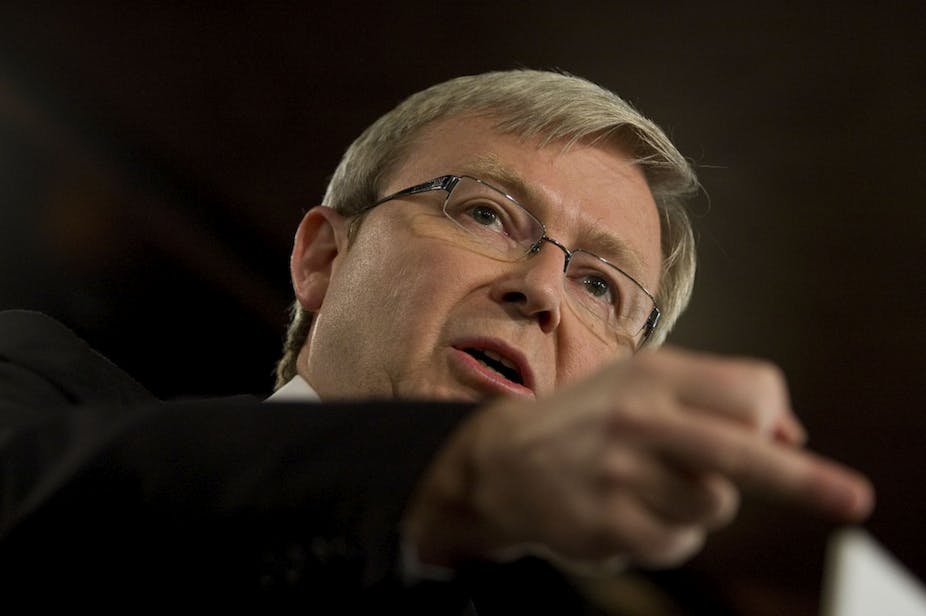If nothing else, Australian politics has been full of surprises since the 2010 election. The hung parliament, the introduction of controversial policies and the recent manoeuvrings over the role of parliamentary speaker have all provided sources of intrigue and debate.
But all of these issues have occurred under the shadow cast by the seemingly incessant leadership battle bubbling along in the Labor Party. Kevin Rudd’s resignation as Australia’s Foreign Minister starts the latest chapter in the ongoing saga.
This battle started as soon as Julia Gillard deposed Rudd as prime minister before the 2010 election. After losing a swathe of seats, Gillard was able to return Labor to the government benches, albeit in a minority government situation.
Perhaps this was a poisoned chalice for Gillard. Not only are hung parliaments rare in Australian federal politics, they are also notoriously difficult to manage as compromise becomes an even bigger part of government decision-making.
This would, in some part, explain why one of the first policies pursued by the Gillard government was the carbon tax – something that key independents and the Australian Greens supported. The problem here was that Gillard was accused of having broken an election promise which fanned debates about her “trustworthiness”. When coupled with the way in which Gillard initially took the prime ministership from Rudd in the first place, the prime minister’s character became a topic of intense debate.
Indeed, public opinion polls highlight how the government’s support dived from the moment the carbon tax was proposed by Gillard in 2011. Ever since then, the government, and Gillard in particular, have struggled to reconnect with voters. The sense has been that voters stopped listening to the government.
The barrage of opinion polls have also clearly played a role in stoking the debate about the leadership of the Labor Party with Kevin Rudd often outpolling Julia Gillard as preferred leader. With constant speculation about the leadership, the government simply could not shift attention to the policy debate. It needed a circuit breaker and Rudd’s resignation may be just that.
In his speech, delivered in a most dramatic way while in Washington, Rudd was openly critical of the power factions wield in the Labor Party. Indeed, Gillard is a product of the party’s factions while Rudd is still a relative outsider when it comes to factional links.
Rudd’s initially high public opinion results served as a substitute for his lack of factional backing. When the polls turned, so too did support for his prime ministership. Other issues, such as those covered by his critics in a recent episode of Four Corners also contributed to his down fall.
With speculation about the party leadership reaching a high point last week, Rudd’s absence from the country appeared to have quelled some of his support. Senior Labor figures, such as Simon Crean, castigated Rudd’s actions in public and the pro-Gillard supporters seemed to have reclaimed the ascendency. Rudd clearly needed to take back the initiative and he’s done so by resigning from the ministry.
Rudd’s resignation has opened up a number of paths for his political future, with none looking like it holds a happy ending for Prime Minister Gillard.
Now without a portfolio, Rudd has much more time to indulge in writing opinion pieces and speak with the media without the constraints of being responsible for a government department. But he may become a liability for the government in this capacity and his presence would constantly haunt Gillard in parliament.
If he decides to resign from parliament, a by-election will be triggered in his Queensland seat of Griffith. The problem for Labor is that it is polling very poorly in Queensland and would probably lose the contest. This could spell the end of the Labor government as its majority in parliament is already wafer thin. If Rudd was to take this option, he risks being branded a “rat” by the party.
The third path Rudd may take is to challenge for the leadership, but on current reports it seems unlikely he would have the numbers. He could decide to bide his time and plan for another go at the prime ministership at a later date. This would involve doing something he opposed in his resignation speech – attacking by stealth. This approach was used to great effect by Paul Keating against Bob Hawke in 1991. After “doing the numbers” as a backbencher, Keating launched a second and ultimately successful bid to topple Hawke.
Rudd’s political future will be clearer in a few days when he returns to Australia but it looks like there is still much to go in the Gillard vs Rudd battle.

